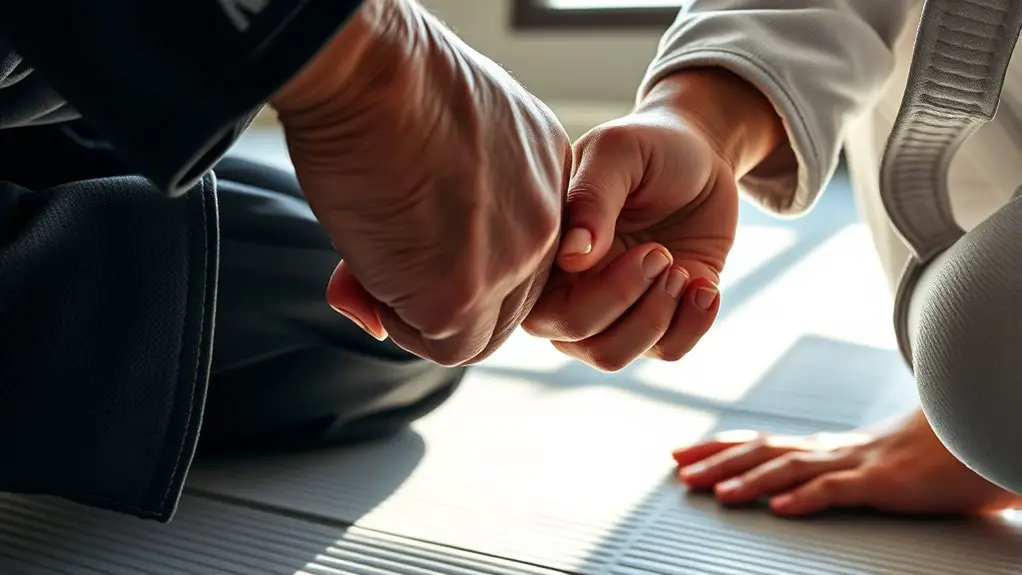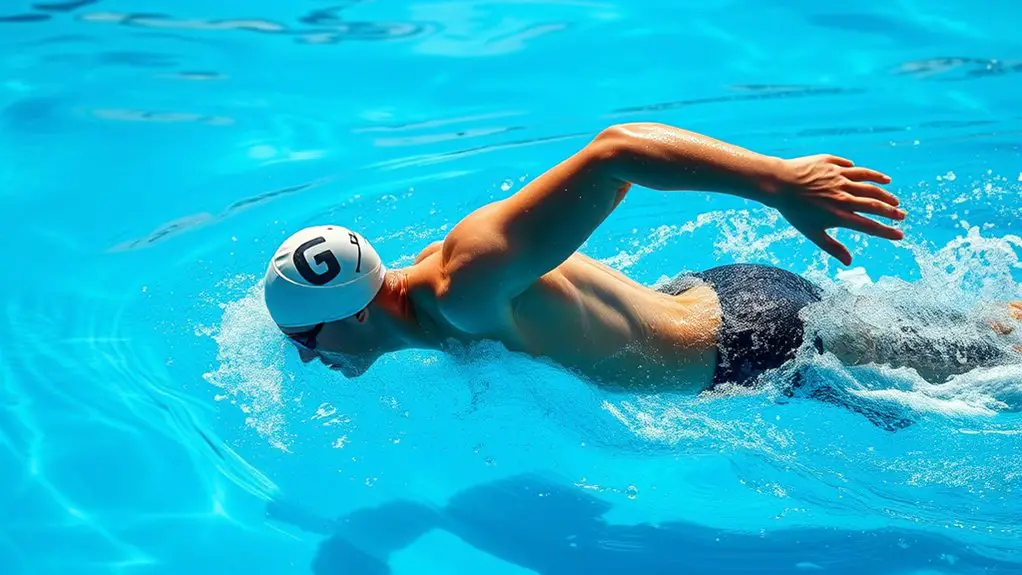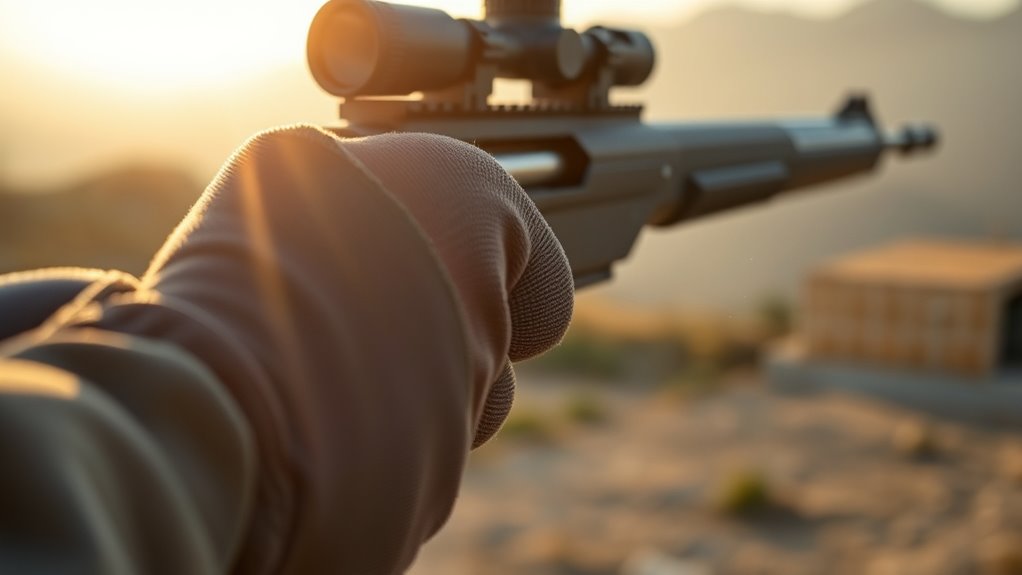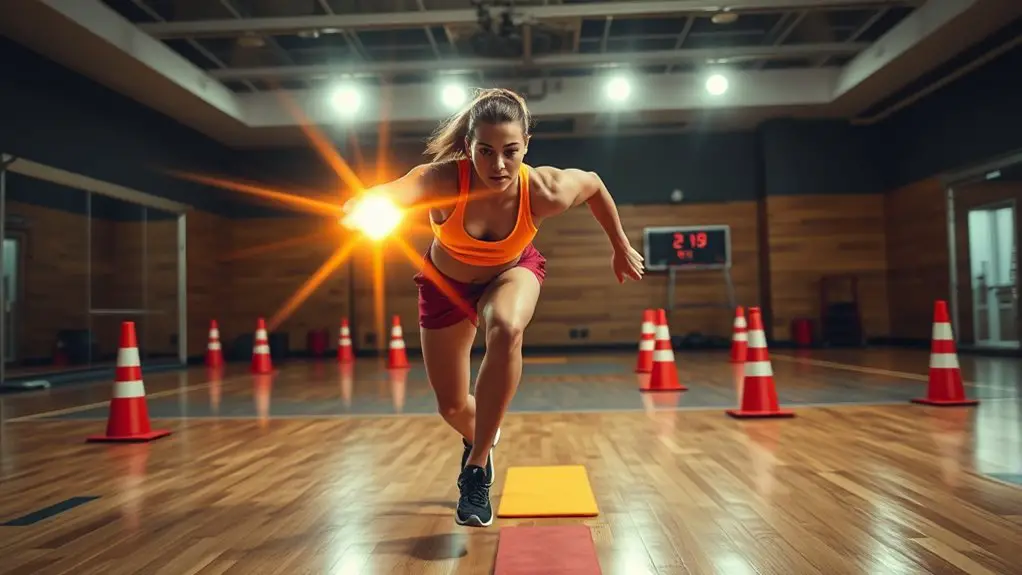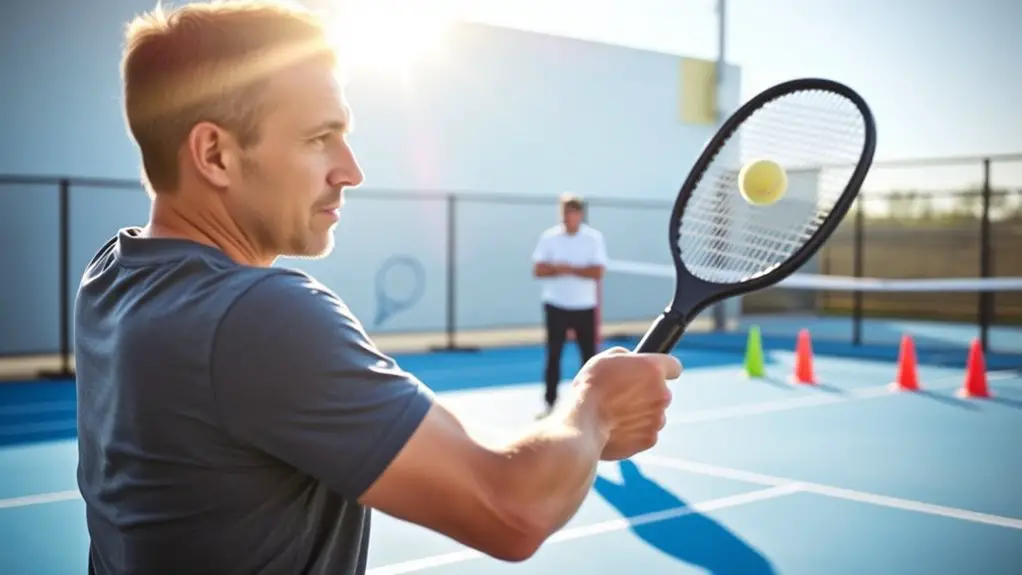Grip strength is essential in Brazilian Jiu-Jitsu as it directly impacts your control over opponents and your performance during matches. A strong grip enhances endurance, helping you mitigate fatigue while executing techniques and submissions. It allows for effective leverage and positional dominance, making it harder for opponents to escape. Improving your grip strength not only boosts your confidence but also elevates your overall enjoyment and success on the mat. Discover how to enhance this important aspect further.
Understanding Grip Strength in BJJ
Grip strength is an essential component of Brazilian Jiu-Jitsu (BJJ) performance. When you're on the mats, your grip can mean the difference between success and failure. Developing grip endurance is important, as it allows you to maintain control over your opponent without tiring quickly. You'll find that different grip variations, like the palm-up or palm-down grip, can be used strategically to enhance your game. Each variation has its purpose, and mastering them lets you adapt to various situations, keeping your opponent guessing.
As you work on your grip strength, remember that it's not just about raw power; it's about technique and endurance, too. By focusing on both aspects, you'll gain the freedom to execute your techniques effectively, allowing you to flow in your movements. Consistency in grip strength training is key to improving your overall performance, so embrace the challenge, and watch how your grip strength transforms your BJJ journey.
The Mechanics of Grip in Grappling
While many aspects of grappling require strength and agility, the mechanics of grip play an essential role in your overall performance. Understanding grip dynamics can elevate your game, allowing you to control opponents and create opportunities. Different grip types, like the palm-to-palm or over-under grips, serve unique purposes in various situations.
When you experiment with these grips, you'll discover how they affect your leverage and balance. A strong grip doesn't just enhance your hold; it enables you to dictate the pace of the match. By mastering the subtleties of grip mechanics, you can fluidly shift between techniques. Pay attention to how your grip feels in different positions; this awareness can lead to tactical advantages. Ultimately, the right grip type can empower your movements, giving you the freedom to express your style on the mat while effectively countering your opponent's strategies. Additionally, improving grip strength can significantly enhance your performance during grappling sessions.
Impact of Grip Strength on Submissions
When you apply a strong grip during submissions, it can greatly enhance your ability to control your opponent and secure the finish. A firm grip not only allows you to maintain positional dominance but also boosts your submissions efficiency. You'll find that the tighter your hold, the more leverage you have, making it much harder for your opponent to escape or counter your moves. However, be mindful of grip fatigue; holding on too tightly for too long can drain your strength and hinder your performance. It's crucial to balance your grip strength—enough to keep your opponent in check, but not so much that it leaves you vulnerable. Practicing techniques that improve your grip can lead to more successful submissions, letting you feel that exhilarating freedom of victory on the mat. Ultimately, mastering grip strength will elevate your game and help you achieve your goals in Brazilian Jiu-Jitsu. Additionally, developing grip strength through targeted exercises can enhance your overall performance on the mat.
Grip Strength and Positional Control
Maintaining strong positional control in Brazilian Jiu-Jitsu often hinges on your grip strength. When you establish grip dominance, you can dictate the pace and direction of the roll, making it hard for your opponent to escape or counter your moves. Strong grips allow you to maintain positional advantages, whether you're on top or bottom.
For instance, when you have a solid grip on your opponent's sleeve or collar, you can pull them into your desired position, limiting their mobility. This control isn't just about holding on; it's about leveraging your grip to create opportunities for sweeps or submissions.
In contrast, weak grip strength can lead to losing your position, allowing your opponent to capitalize on your mistakes. By focusing on developing grip strength, you enhance your ability to maintain control, giving you the freedom to execute your game plan effectively.
Injury Prevention Through Grip Training
Injuries can often derail your progress in Brazilian Jiu-Jitsu, but incorporating grip training into your routine can considerably reduce that risk. By focusing on your grip strength, you're not just enhancing your performance; you're also laying the groundwork for effective injury prevention. Stronger grips help you maintain control during training and competitions, which means you're less likely to find yourself in compromising positions that could lead to injuries.
When your grip strength is solid, your joints and muscles experience less strain, reducing the likelihood of overuse injuries. You'll feel more confident in your techniques, allowing you to train harder and longer without the fear of getting hurt. Plus, grip training can help balance muscle development, keeping your body more aligned and resilient. So, embrace grip training as an essential part of your BJJ journey, and watch how it empowers you to stay free and injury-free on the mats.
Enhancing Grip Strength: Training Techniques
To enhance your grip strength effectively, incorporating a variety of training techniques is essential. You'll find that mixing grip exercises with tools like resistance bands can yield impressive results. Here are some techniques to contemplate:
| Grip Exercise | Resistance Bands |
|---|---|
| Farmer's Walk | Band Pull Aparts |
| Dead Hangs | Finger Extensions |
| Plate Pinches | Wrist Flexion/Extension |
Experiment with these methods to see what works best for you. For instance, the Farmer's Walk not only strengthens your grip but also enhances your overall stability. Incorporating exercises like squats can additionally improve your overall athletic performance, as they engage multiple muscle groups and promote balance. Resistance bands allow for dynamic movements that engage various muscle groups, giving you the freedom to train effectively. Remember, consistency is key—make these exercises a part of your routine, and you'll notice a significant improvement in your grip strength over time. Embrace the journey toward a stronger grip!
Grip Strength in Competitive BJJ
While many factors contribute to success in Brazilian Jiu-Jitsu, grip strength often plays a pivotal role in competitive performance. Your ability to maintain grip endurance can make the difference between victory and defeat. Strong grips allow you to control your opponent's movements and dictate the pace of the match. To enhance your competitive edge, consider focusing on these aspects of grip strength:
- Grip Variations: Practice different grips like overhand, underhand, and thumb grips to adapt to various situations.
- Endurance Training: Incorporate exercises that build stamina, ensuring you maintain your grip throughout the fight.
- Dynamic Techniques: Work on shifting between grips smoothly, allowing you to respond effectively to your opponent's actions. Additionally, prioritizing joint health through specific exercises can improve overall grip strength and performance.
Conclusion: The Importance of Grip in BJJ Performance
Grip strength is more than just a physical attribute; it's a game-changer in Brazilian Jiu-Jitsu performance. When you step onto the mat, your ability to maintain grip endurance can elevate your game from ordinary to extraordinary. It's not just about holding on; it's about tactical gripping—knowing when to squeeze to control your opponent and when to relax to conserve energy.
Imagine the freedom of flowing through techniques with confidence, knowing your grip won't fail you. Strong grips allow you to dictate the pace of the match, create openings, and escape from tight situations. It empowers you to seize opportunities and navigate those moments of uncertainty with ease.
In BJJ, your grip isn't just a tool; it's an extension of your strategy. So, focus on developing that grip endurance. It'll not only enhance your performance but also your overall experience on the mat, giving you the freedom to truly express your skills.
Frequently Asked Questions
How Does Grip Strength Vary Between Different BJJ Practitioners?
Grip strength varies considerably among practitioners, whether you're a beginner or an advanced player. Beginners might focus on developing basic grip strength techniques in a controlled training environment, while advanced practitioners often refine their grip through more challenging scenarios. The differences can stem from experience, training styles, and specific techniques employed during practice. You'll notice that those with stronger grips often have an advantage, allowing for greater freedom in executing moves during sparring.
Can Grip Strength Influence a Coach's Effectiveness in Teaching Techniques?
Think of a coach as a gardener, nurturing growth in their students. Just like a plant needs strong roots to flourish, you need effective grip techniques for your coaching strategies. If your grip strength is solid, you can demonstrate techniques with confidence, inspiring trust and engagement. This influence can empower your students, helping them blossom in their Jiu-Jitsu journey. So, yes, grip strength can greatly enhance your effectiveness as a coach.
Are There Specific Grips That Require Different Strength Levels?
Absolutely, there're specific grips that require different strength levels. For instance, some grip variations, like the gi grip, demand more endurance and finger strength, while others, like the collar grip, might need raw pulling strength. Depending on your training focus, you might develop different strength types to excel in these grips. Enhancing your grip strength can give you the freedom to explore various techniques and improve your overall performance on the mat.
How Can Nutrition Affect Grip Strength in BJJ Athletes?
Nutrition plays an essential role in your grip strength. By focusing on nutrition timing, you can fuel your body effectively before training or competition, ensuring your muscles are primed for action. Staying on top of your hydration balance is equally important; dehydration can lead to decreased performance and strength. So, make sure you're eating well and hydrating properly to enhance your grip and overall performance on the mat.
What Role Does Mental Focus Play in Grip Strength During Competitions?
Mental focus plays a vital role in your grip strength during competitions. When you're mentally resilient, you can push through fatigue and distractions, maintaining a strong grip when it matters most. Utilizing focus techniques like visualization or breath control can enhance your performance, allowing you to tap into your physical potential. By staying mentally sharp, you not only improve your grip strength but also gain the freedom to execute your techniques with confidence.
